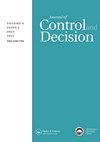False data injection attacks on networked control systems
IF 1.8
4区 工程技术
Q3 AUTOMATION & CONTROL SYSTEMS
引用次数: 0
Abstract
AbstractThe integration of cyber (network) with physical world is a big step in cyber-physical systems. This has revolutionised many industries. But this transformation has made cyber-physical systems vulnerable to attacks. One particular type of attack is the adversarial false data injection which injects false data in either the sensor measurements or the corresponding communication channel. A better understanding of how false data injection (FDI) attacks are constructed is crucial for developing strategies to protect against such attacks. In this paper, we consider two models for networked control systems and present an algorithm for constructing FDI attacks in each case and compare with an existing approach. The conditions for the attack to remain stealthy for systems equipped with a χ2 failure detector and the design of attack vectors that satisfy these conditions are discussed in detail. The algorithms are demonstrated by developing FDI attacks for two real-world examples.Keywords: False data injectionnetworked control systemcyber-physical systemcyber-attackmalicious data Disclosure statementNo potential conflict of interest was reported by the author(s).Additional informationNotes on contributorsSyed Ahmed PashaSyed Ahmed Pasha was born in Rawalpindi, Pakistan. He has a Bachelors degree in Electrical Engineering (2001). His Ph.D. (UNSW, 2009) is in Electrical Engineering. He has held two postdoc positions (UNSW, 2009–2011 & USyd, 2012–2013). He is currently Associate Professor at Air University, Pakistan and Visiting Fellow at UNSW since 2012. His research interests are in control and signal processing.Rijha SafdarRijha Safdar did her B.E. from Air University, Pakistan in 2015. She received an MS in Electrical Engineering in 2019 from National University of Sciences and Technology, Pakistan, where she is pursuing a Ph.D. in Electrical Engineering. She is currently Assistant Manager at Centre of Excellence in Science & Applied Technologies, Pakistan. Her research interests include control and cyber security.Syed Taha AliSyed Taha Ali did his BSc. from GIK Institute of Engineering Science and Technology in Pakistan in 2002, followed by an MS and PhD in Electrical Engineering from the University of New South Wales, Australia in 2006 and 2012. He did his postdoctoral research at the University of New South Wales, Australia, in 2013, and at Newcastle University, UK from 2014 to 2016. He is currently Associate Professor at National University of Sciences and Technology, Pakistan. His research interests include network security, cryptocurrencies, election protocols, and security applications of computer vision.对网络控制系统的虚假数据注入攻击
摘要网络与物理世界的融合是网络-物理系统的一大进步。这给许多行业带来了革命性的变化。但这种转变使网络物理系统容易受到攻击。一种特殊类型的攻击是对抗性虚假数据注入,它在传感器测量或相应的通信通道中注入虚假数据。更好地理解虚假数据注入(FDI)攻击是如何构建的,对于制定防范此类攻击的策略至关重要。在本文中,我们考虑了网络控制系统的两种模型,并提出了在每种情况下构建FDI攻击的算法,并与现有方法进行了比较。详细讨论了配备χ2故障检测器的系统保持攻击隐身的条件以及满足这些条件的攻击向量的设计。通过开发两个实际示例的FDI攻击来演示算法。关键词:虚假数据注入网络控制系统网络物理系统网络攻击恶意数据披露声明作者未报告潜在的利益冲突。赛义德·艾哈迈德·帕夏(syed Ahmed Pasha)出生于巴基斯坦拉瓦尔品第。他拥有电气工程学士学位(2001年)。他的博士学位(新南威尔士大学,2009)是电气工程。先后在新南威尔士大学(2009-2011)和悉尼大学(2012-2013)担任博士后。他现任巴基斯坦航空大学副教授,2012年起担任新南威尔士大学访问学者。主要研究方向为控制与信号处理。Rijha Safdar于2015年在巴基斯坦航空大学获得学士学位。她于2019年获得巴基斯坦国立科技大学电气工程硕士学位,目前正在攻读电气工程博士学位。她目前是巴基斯坦科学与应用技术卓越中心的助理经理。她的研究兴趣包括控制和网络安全。赛义德·塔哈·阿里获得了学士学位。2002年从巴基斯坦GIK工程科学与技术研究所毕业,2006年和2012年分别从澳大利亚新南威尔士大学获得电气工程硕士和博士学位。2013年在澳大利亚新南威尔士大学进行博士后研究,2014年至2016年在英国纽卡斯尔大学进行博士后研究。现任巴基斯坦国立科技大学副教授。他的研究兴趣包括网络安全、加密货币、选举协议和计算机视觉的安全应用。
本文章由计算机程序翻译,如有差异,请以英文原文为准。
求助全文
约1分钟内获得全文
求助全文
来源期刊

Journal of Control and Decision
Mathematics-Control and Optimization
CiteScore
2.80
自引率
17.60%
发文量
76
 求助内容:
求助内容: 应助结果提醒方式:
应助结果提醒方式:


